ARTICLE AD BOX
Formula 1's governing body the FIA is under intense scrutiny in the wake of the controversial end to the 2021 world championship in Abu Dhabi on Sunday.
The handling of the sport's rules during the safety-car period that ultimately decided the drivers' title in Max Verstappen's favour has focused a deeper discontent that already lurked beneath the surface of the sport.
F1 teams and drivers were dismayed by the events at the end of the Abu Dhabi Grand Prix, after a season in which many have complained about the consistency of the FIA's decision making.
Many felt the rules were not followed correctly at Yas Marina, and now a number of F1 insiders believe that changes need to be made at the FIA.
The subject is controversial, so senior figures have not been prepared to speak on the record in the immediate aftermath of the race.
But a number have told BBC Sport that at least half the F1 teams have lost confidence in race director Michael Masi, and that many of the drivers have concerns as well.
- 'A deserved title decided by a questionable call'
- 'It's been manipulated' - Hamilton radio message emerges
Why was Abu Dhabi so contentious?
Masi is at the centre of the controversy because, as race director, he was the man who made the decisions at the end of the Abu Dhabi Grand Prix, and has been involved in other contentious moments through the past year or so.
The key concern is whether Masi correctly followed the FIA's rules in the operation of the safety car and the restarting of the race for one final shootout lap.
Concern focuses on two areas:
- His decision to allow only some of the lapped cars to overtake - the five between Hamilton and Verstappen - and not the others, for example the two between Verstappen and third-placed Carlos Sainz's Ferrari.
- The timing of the end of the safety-car period.
Both questions, and those over the decision of the stewards to reject Mercedes' protest against Masi's decisions, are dealt with in detail in this article.
But the over-riding concern is that controversial decisions, which seem to many to be contrary to the FIA's own rules, had a direct influence on the outcome of the championship.
Mercedes' appeal process aside, it's important to point out that none of these wider questions within F1 should be seen as being about the specifics of who should and should not be world champion. They are about a concern for fair and equitable competition.
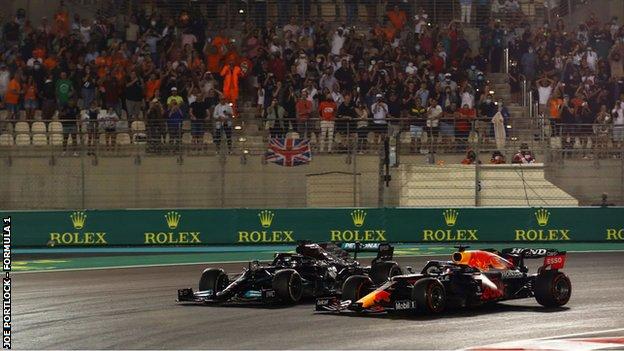 The title battle went down to the last lap of the season's final race
The title battle went down to the last lap of the season's final raceAre there problems with the stewards' decision?
In the context of a year in which consistency of rule application has been a hot topic, Masi's operational calls in Abu Dhabi, and the stewards' decision defending them, raise further questions.
In 2020, there was a safety-car period during the Eifel Grand Prix at the Nurburgring. Both Hamilton and Verstappen complained it had been unnecessarily long.
Masi was asked about this after the race. He said: "There's a requirement in the sporting regulations to wave all the lapped cars past."
So, he seems to have changed his mind on the meaning of the relevant rule over the last year - he followed one course of action with regards to lapped cars in Germany last year, and another in Abu Dhabi.
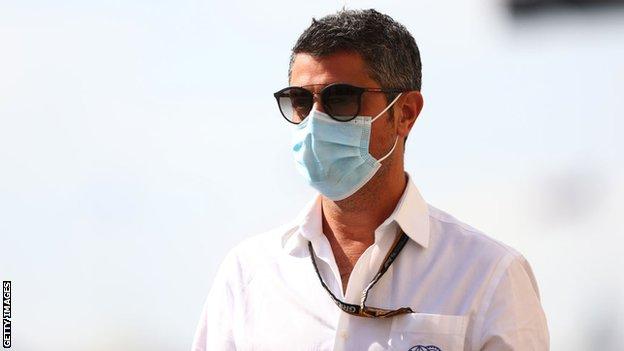 Michael Masi has been Formula 1 race director for the past two seasons
Michael Masi has been Formula 1 race director for the past two seasonsWhat other problems have there been?
The entire season has been littered with questions over the consistency of penalty application and decision making, much of it surrounding Verstappen.
At November's Brazilian Grand Prix, Verstappen was not penalised for forcing Hamilton off the track as the Briton tried to pass him for the lead.
This decision caused consternation among many drivers, who felt the move should have earned him a penalty.
McLaren's Lando Norris, who had been penalised in a similar situation in a fight with Red Bull's Sergio Perez in Austria earlier in the year, was among them, as were Sainz and his Ferrari team-mate Charles Leclerc.
At the subsequent race in Qatar, all the drivers discussed this with Masi and the stewards to try to establish a definition for what was allowed in wheel-to-wheel racing. After the meeting, a number emerged saying that the situation was still not clear. They had been told that forcing a driver off the track was not allowed but that the matter was at the discretion of stewards' panels at each race.
The race after that, in Saudi Arabia, Verstappen pulled an almost identical move on Hamilton - and was given a five-second penalty. Little wonder, then, that he entered the final race of the season complaining of inconsistency and saying that he was treated differently from other drivers, saying: "The only thing I ask is that it's fair for everyone. That's not the case."
Regardless of the debate over Verstappen's aggressive driving, and whether he was right in the specific incidents he was referring to, his underlying point reflected the concerns of many drivers.
Masi's future and deeper issues
The problem for the FIA, insiders say, is that the spotlight on Abu Dhabi was so bright, in the context of the gripping title fight between Hamilton and Verstappen, that F1's reputation as a responsibly and effectively governed sport is on the line.
And this not only has potential ramifications for the image of the FIA, but also for the bottom line of owner Liberty Media. One figure involved in the financial side of F1 pointed out that while some investors will be attracted by F1's huge global impact in the past week, others will have questions about whether a sport run in such a way is a sensible place to invest their money.
It only takes a glance at the eruption over this topic on social media to see that among the questions being asked was whether the decisions were made specifically with a view to provide entertainment.
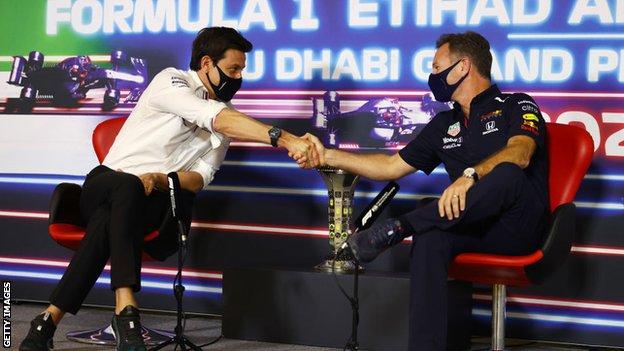 Mercedes team principal Toto Wolff with Red Bull boss Christian Horner
Mercedes team principal Toto Wolff with Red Bull boss Christian HornerThis impression was hardly diminished by Red Bull team principal Christian Horner admitting that F1 bosses had discussed trying to ensure races did not end under safety-car conditions because it's an anti-climax.
In that sense, whether right or wrong, there is the impression of blurred lines between the legislative arm of the sport, the FIA, and the commercial, F1 - two bodies that are required to be independent of each other under an agreement made with the European Commission more than 20 years ago.
This was a question raised after the controversy of the Belgian Grand Prix this year, when after hours of delay caused by bad weather, the race ran for just two laps behind the safety car before it was called off and half-points awarded.
Had Abu Dhabi been the first controversial decision of Masi's tenure, it would have been unfortunate, but unlikely to have led to so many questions about his position.
But in the context of so many over the last two years, some are privately saying that they believe Masi may struggle to survive the fallout of Abu Dhabi.
Is it all Masi's fault?
If he does go, some will certainly not mourn him. But others express regret about the situation, saying that Masi is trying hard to do his best in a difficult job in extremely demanding circumstances, and is not helped by the lack of structure around him.
Some say he is isolated in race control and that adequate support is not available.
He's too easily accessed by the team principals on the radio, others claim, leading to some of the conversations between him and Mercedes F1 boss Toto Wolff and Horner in Abu Dhabi as the leaders of the two title-contending teams sought to advance their positions.
The broadcasting of these conversations - a new phenomenon in recent times - has raised further questions as to whether Masi's decisions are being unduly influenced by teams.
And teams point to other ways in which they believe the FIA's response to contentious issues could have been more satisfactory.
An example was the row over flexible rear wings in the first half of the season, a technical issue and therefore the responsibility of the FIA's head of single-seater matters Nikolas Tombazis, not Masi.
Red Bull and several other teams had designs that leaned backwards beyond a certain speed on the straights to reduce drag - they became known as "limbo wings".
This is clearly not allowed by a rule that forbids moveable aerodynamic devices, but the wings in question passed all the relevant load tests.
Eventually, the FIA introduced new, stricter tests - but gave the teams a number of races' grace to allow them time to modify their designs. This was much to the frustration of those teams who had highlighted the problem, including Mercedes. They felt not only that action should have been taken much sooner, but that there was no need for such an extensive delay in solving the issue.
What is the FIA doing about all this?
It seems the FIA had already realised there were some issues it needed to address.
This week, BBC Sport can reveal, the organisation will announce the appointment of Peter Bayer, its secretary general for motorsport, to a newly established position of executive director of F1. In this, he will oversee Masi, Tombazis and technical director Jo Bauer, among other staff.
This is in some ways a reconstitution of the role of the late Charlie Whiting, the FIA's highly respected former director of F1, who died on the eve of the 2019 season - and who, in Saudi Arabia, Horner said the sport was missing.
Being race director was part of Whiting's responsibilities, and as a result people have incorrectly assumed that Masi is his replacement. He's not. Masi was merely appointed to fill one part of Whiting's remit. The rest of Whiting's job - keeping the running of F1 by the FIA on an even keel - had not been replaced until now.
The FIA would not comment on whether it was conducting any internal inquiry into the controversy of Abu Dhabi, or whether its running of F1 or the rules themselves have been fit for purpose this year.
But a spokesman did point out that it does not exist to satisfy the F1 teams, and that every decision it makes in the sport is likely to displease someone.
"Our role is to respect the rules and to be impartial and fair and transparent," he said.
On that, the F1 teams would agree. But not necessarily on whether the FIA has been succeeding.
A looming election
All this provides the backdrop for the election of a new FIA president on Friday, after the organisation's annual prize-giving ceremony on Thursday.
The candidates are Englishman Graham Stoker and Emirati Mohammed bin Sulayem. They have been spending the past few months trying to drum up support among the member clubs around the world, and the election is said to be too close to call.
The FIA is responsible for much more than motorsport - as current president Jean Todt and his predecessor Max Mosley proved by expending great energy on trying to improve road safety around the world, with considerable success.
But F1 is the FIA's poster child. So whoever wins the election will have these issues very much at the top of their in-tray.

- 'He lived for his music': The extraordinary story of Freddie Mercury and his battle with Aids
- From John O'Groats to Land's End: Meet the man who's driving 870 miles in the world's smallest car


 3 years ago
36
3 years ago
36
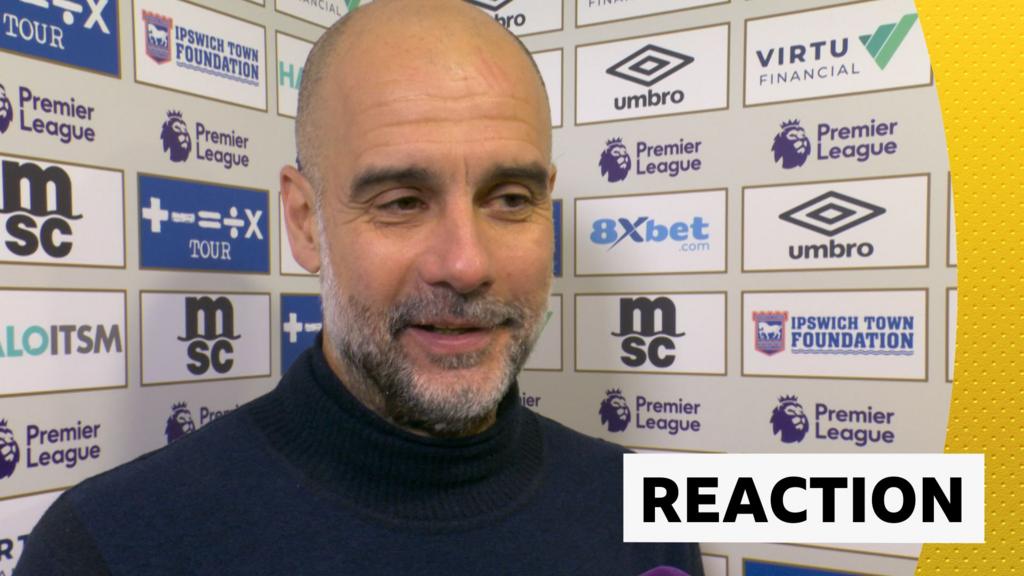

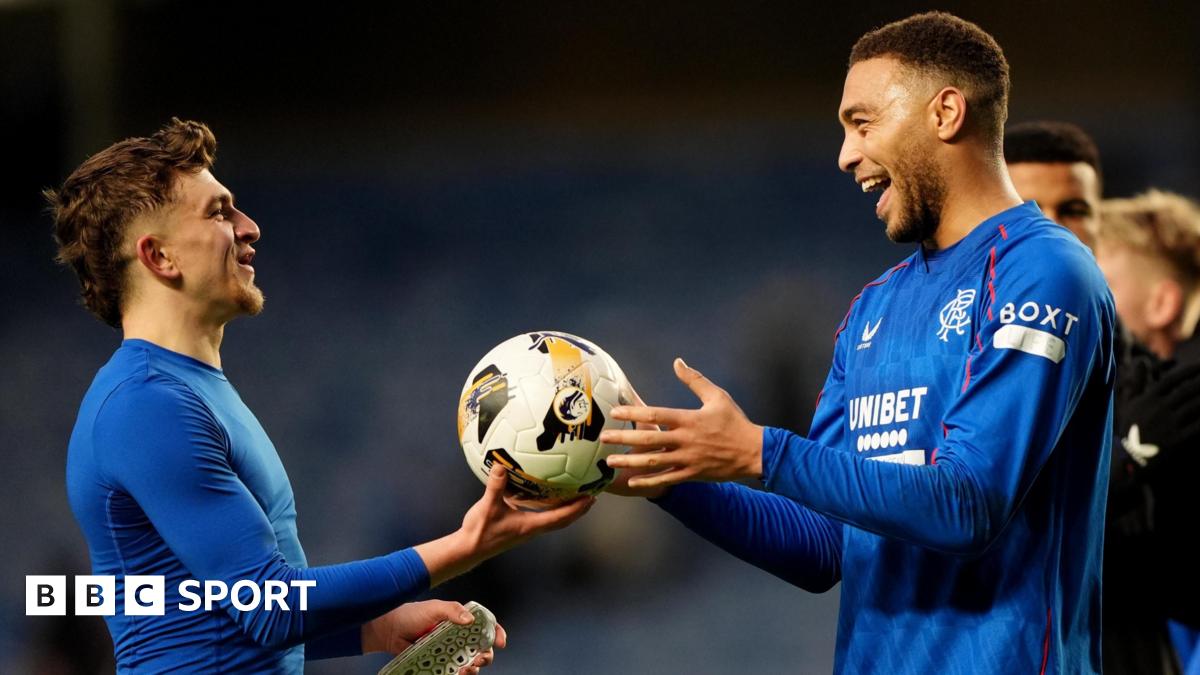





 English (US) ·
English (US) ·